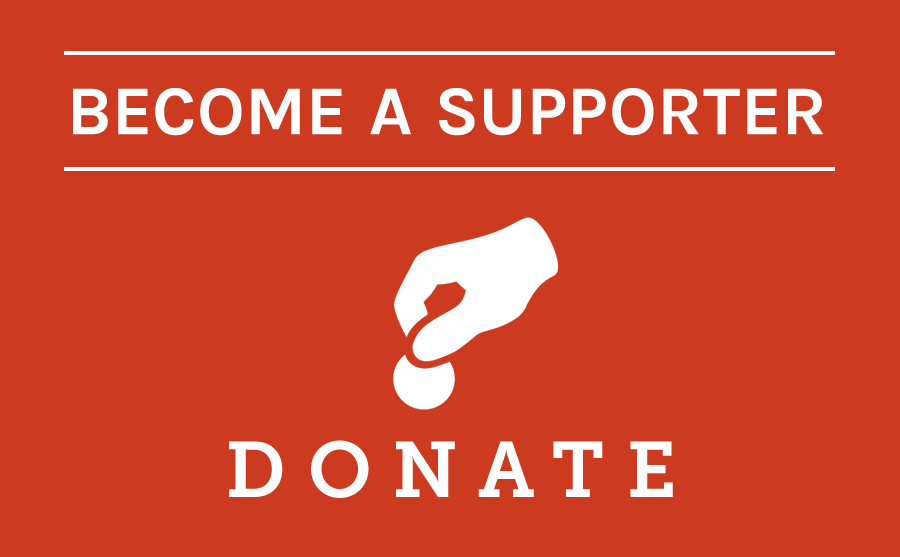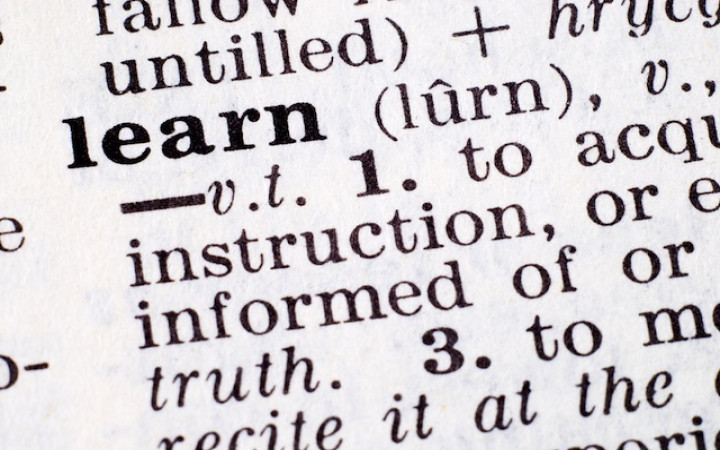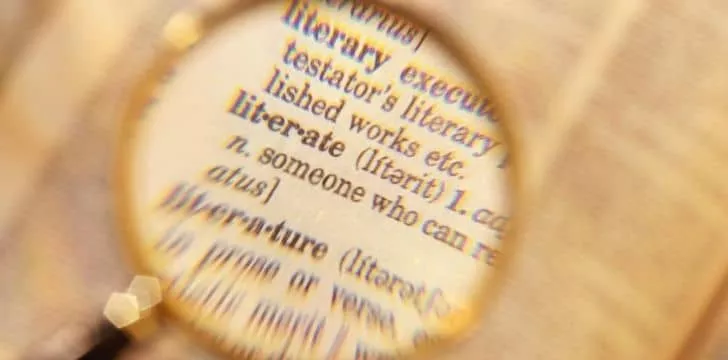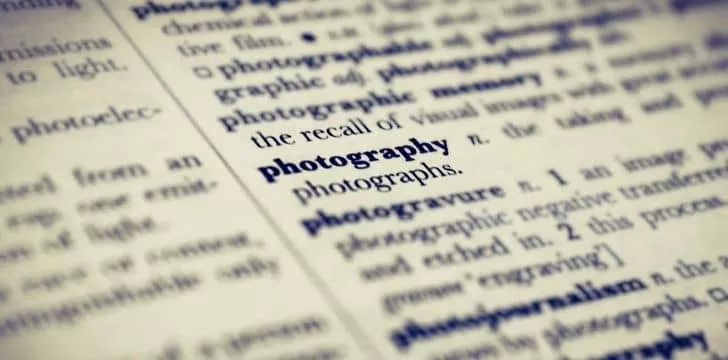A while ago, we were asked a question: has the Internet changed the pace at which new words enter the dictionary? Do we enter new words more quickly now? The answer was so interesting that we ended up writing a series of articles on slang in the dictionary. Today, we’ll begin with the obvious: How does any word get into the dictionary? Next, we’ll look at the earliest dictionaries to include slang, and our third installment will focus specifically on the Internet and the dictionary.
Click here to see the infographic that accompanies this story.
Dictionaries have always been data-driven. A dictionary isn’t an idea museum, it’s a user’s manual for communication.
So how does a word get into the dictionary?
A word gets into a dictionary when it is used by many people who all agree that it means the same thing. If your toddler nephew invented a great word that the English language simply can’t do without, don’t write to us to recommend that it be added to the dictionary. Use it. First, you drop the word into your conversation and writing, then others pick it up; the more its use spreads, the more likely it will be noticed by dictionary editors, or lexicographers. If your nephew’s word is one that English speakers decide we need, it has a good chance of getting into the dictionary.
Reading is an important part of a lexicographer’s job.
This is what dictionary editors do all day
Dictionary editors read actively, looking for changes in the language. To find vocabulary that has entered mainstream life—terms like bucket list or sexting or unfriend, we look at sites and publications with wide national readership. For words that begin as specialized vocabulary but might become more common over time, we look at medical, industry, and tech journals for words like obesogenic and fracking. Captions for comic strips have lots of words that are more frequently spoken than written. It all adds up.
We collect citations of new words
Each example of a word becomes a citation that is collected with its context and source and then keyed into a searchable database that constitutes the first stage of research for the dictionary. These hand-chosen examples form a unique corpus that is the raw form of the dictionary—they provide both the evidence of a word’s use and the basis for extracting a definition from the way the word is used in the citation. We collect new words as well as new ways of using old words, which can be much harder to detect. We have nearly 17 million such citations.
Next, we research how widely a new word is used
We search through other databases that include millions of words in the form of complete articles, books, and speech. We’re looking for three criteria: frequent use, widespread use, and meaningful use. Frequent means that the word is used that way over time. If it’s a trendy flash in the pan that comes and goes, we don’t enter it into the dictionary. Widespread usually means that the word is used by people across industries or regions, in other words that an average adult is likely to encounter the word and need to know what it means. Meaningful should be obvious, but it isn’t, always. Famously, the “longest word in the dictionary” isn’t actually a word by these standards, because it’s never used to mean what it seems to describe. It’s only used as an example of a very long word. It’s not in our dictionary.
The definer must judge whether there is enough evidence to put a new word in; that judgment will be reviewed by more senior colleagues as the dictionary moves through the editorial process, but there’s no committee, no advocacy, no meetings for new word inclusion. If a word seems promising but shows insufficient evidence for inclusion this time around, those citations will be reviewed for the next edition, at which time the word may have flourished—or vanished.
Some “new” words are already in the dictionary
New words like hashtag and selfie get a lot of attention, but many of the new words we add are new meanings of words that are already staples in our language: think of the recent meanings of mouse and cookie that have nothing to do with rodents or baked goods. The Internet-specific senses of lurk and browse built upon the existing meanings of those terms. A verb that we use every day, access, was first entered in the Collegiate Dictionary in 1973, and a specific reference to computers was added in 1993. These words may not make headlines, but they’re just as important as words that are newly coined.
What about words that don’t make it into the dictionary?
They’re still real words! Many words that aren’t widespread enough to make it into the dictionary—words that are particular to a region or profession or even a family—are perfectly good words; it’s just unlikely that a person outside that area or group would encounter them. For now.
Next: Slang and the Dictionary

LANGUAGE ARTS — Languages
Have You Ever Wondered…
- How do words get added to the dictionary?
- Who decides what words or phrases get added to the dictionary each year?
- What factors determine whether new words or phrases get added to the dictionary?
What do “carbon footprint,» “webisode» and “staycation» all have in common? All three are new additions to Merriam-Webster’s Collegiate Dictionary.
Merriam-Webster says one of the most common questions it is asked is how a new word gets added to the dictionary. The answer is simple: The word gets used.
When deciding what new words or phrases to include in an updated version of the dictionary (and how to define each), editors study language in use, including which words and phrases people use most often and how they use them.
Most editors at Merriam-Webster spend a bit of time each day reading different books, newspapers, magazines and electronic publications. While reading, they keep an eye out for things like new words or phrases, new spellings and new uses for existing words or phrases.
When editors come across something interesting, they mark the word or phrase and collect information that explains how it is used and what it means. This process is called “reading and marking.»
Once a new word or phrase has been marked, editors enter it into a computer system. They also create a “citation,» which includes three things: the word or phrase, an example of the word or phrase used in context and bibliographic information about its source (magazine, newspaper, etc.).
When a word or phrase becomes a citation, it is simply a contestant in a contest. There is no guarantee that a citation will be added to the dictionary. Before a new word can be added to the dictionary, editors must find enough citations to prove it is widely used.
Having many citations, though, does not guarantee admission into the dictionary. If citations do not provide a clear definition of the word or phrase or if all the citations come from one source, it may be rejected.
New words or phrases must be found in several citations from a wide range of publications over a significant period of time to win their way into the dictionary.
In case you’re wondering, here are the definitions of the new words and phrases introduced at the start of this wonder:
- carbon footprint: the amount of greenhouse gases (specifically carbon dioxide) emitted by something during a given period.
- webisode: an episode of a show that may or may not have been telecast but can be viewed at a website
- staycation: a vacation spent at home or nearby
Wonder What’s Next?
Did you know doing the moonwalk can help you lose weight instantly? It’s true. It’s not a special diet or exercise routine, it’s just a matter of science. Join us tomorrow as we journey into outer space and get physic-al.
Try It Out
The dictionary adds a handful of new words and phrases each year, but there are thousands of words in the dictionary that may be new to you. Creating your own Word of the Day Dictionary is a great way to boost your vocabulary.
Creating your dictionary is easy. Just visit Merriam-Webster’s Word Central website for the Daily Buzzword. You’ll be king or queen of the spelling bee in no time!
Once you find your buzzword, write it on a piece of paper, along with its definition. When you’re finished, add a drawing to help others understand what the word means.
Did you get it?
Test your knowledge
Related Wonders for You to Explore

×
Spread the Joy of Wonder
GET YOUR WONDER DAILY
Subscribe to Wonderopolis and receive
the Wonder of the Day® via email or SMS
Join the Buzz
Don’t miss our special deals, gifts and promotions. Be the first to know!
Language is a living thing, and so is Dictionary.com. Our dictionary will always be a work in progress—there’s no day in the future when we’ll mark it “complete” after adding the last word.
This never-ending work is the job of our lexicographers, the (amazingly talented) people who write and edit the dictionary. They do more than just add and define words. They also add new definitions to existing entries for words that have developed new senses over time. They revise definitions that have become outdated or have otherwise changed. And they add and update other key lexicographical content, like pronunciations and etymologies.
How does a word get into the dictionary?
This is one of the most common questions we get—and it’s a great one.
The answer involves one of the most misunderstood things about dictionaries, so let’s set the record straight: a word doesn’t become a “real word” when it’s added to the dictionary. It’s actually the other way around: we add words to the dictionary because they’re real—because they’re really used by real people in the real world.
The criteria
In other words, our lexicographers add a word to the dictionary when they determine that:
- It’s a word that’s used by a lot of people.
- It’s used by those people in largely the same way.
- It’s likely to stick around.
- And it’s useful for a general audience.
All four of these points are important. Our lexicographers look for use not just by one person, but by a lot of people. Of course, many words have different shades of meaning for different people. But to be added to the dictionary, a word must have a shared meaning (that is, it must communicate a widely agreed-upon meaning from one person to the next). If everyone used a word in a completely different way, we wouldn’t be able to give it a definition, right?
Prescriptive vs. Descriptive
As we define it, our mission as a dictionary is to document words as they are actually used. In the world of dictionaries, this approach is called descriptivism. The opposite is prescriptivism, an approach that frames the dictionary in the role of a gatekeeper and is based on prescribing (setting rules for) how words should or should not be used. While prescriptivists might say a slang term is “not a real word,” descriptivists will look at the same term and do research to see if and how it’s commonly used in order to describe (document) its use. (Read more about this in the next FAQ, “That’s not a word.”)
We must acknowledge that, historically, dictionaries have been gatekeepers to nonstandard words and usage (especially those that originate in non-dominant groups), but we at Dictionary.com take very seriously our role and responsibility in ensuring that our dictionary reflects and respects the language of people as they use it.
Our lexicographers will be the first to tell you that documenting language in this way is a “messy business.” It takes a lot of research—and patience.
Identifying and tracking candidates
Lexicographers track a vast number of terms and topics, read a wide variety of writing and transcribed speech, and use corpora (big, searchable collections of texts) to see how terms are actually being used. They then distill this research into concise, informative definitions (along with supplementary information, such as pronunciations or notes about whether a word is offensive, for example).
Because we take this approach, our dictionary contains all kinds of words: standard words, slang words, dialect words, nonstandard words, and more. (Yes, this includes curse words and slurs. Read more about this in the FAQ “This word is offensive.”)
Staying power: prioritizing what gets added
Our main dictionary is a general dictionary, as opposed to a specialized one (like, for example, a medical dictionary—which we do also feature on the site). This means we have to prioritize the addition of terms based on whether the average person will be likely to encounter them—and whether it’s probable that people will continue to use them. For that reason, our lexicographers often wait until a word has gained some currency in the mainstream before selecting it for addition. (Read more about this in the FAQ “That word isn’t new.”)
Short answer: Lexicographers typically wait to add a word to our dictionary until they’ve determined that it has met these criteria:
- It has relatively widespread use.
- It has a widely agreed-upon meaning.
- It seems to have staying power—meaning it’s likely to be used for a long time.
- And it will be useful for a general audience.
That’s not a word. Why is it in the dictionary?
First off, we’re not fans of saying that something is “not a word.” Just because a word isn’t (yet) in the dictionary doesn’t mean that it’s “not a word” or that it’s not a “real word.”
Sometimes, people don’t think a word counts as a word if it’s informal, slang, “too new,” or a term they perceive to be “incorrect.” Irregardless (😉) of how you (or we) may feel personally about a particular word, our mission is to be descriptive—we work to describe and document language as it is really used (not just how we or others may want it to be used).
It’s important to note that judgments about what “counts” as a word often originate in conscious or unconscious biases, particularly about other people’s education, identity, or level of language proficiency.
Like we explained in the answer to the last question, we add a word to the dictionary when we observe a lot of people using it in the same way—and this includes many informal, slang, and nonstandard terms. You have the freedom to decide whether or not to use a word, but just because you don’t like it doesn’t mean it ain’t a word.
Short answer: Our mission is to document and define words as they’re actually used—not to be gatekeepers or make rules about what is or is “not a word.” And just because a word is not in the dictionary doesn’t mean it’s not a word.
Do you think supposably belongs in the dictionary? Find out why it’s there.
That word isn’t new. Why are you adding it now?
Just because a word is newly added to our dictionary doesn’t mean it’s brand new to the English language. That’s why we like to refer to newly added words as “new entries,” as opposed to “new words,” which can imply that they’ve very recently been coined.
In fact, it’s rare for us to add a very recently coined term unless it’s clear that it has rapidly gained widespread use and that such use is likely to continue. Brand new words sometimes burn brightly but then quickly die out, so our lexicographers look for evidence of staying power in the lexicon. It takes time to gather such evidence and for words to settle in. This is especially the case for informal words that originate in a particular dialect or group, which take time to spread from speech to writing, an important part of evidence-gathering.
Waiting so long to add some terms may make it look like we’re behind the times, like a person who sounds cheugy for using a trendy slang term way after its moment has passed. It’s an occupational hazard, but with so many possible terms to add, we have to make tough decisions about what to prioritize. Especially since prioritizing one word may mean pushing another down on the list. (And yes, there is a list. More like lists of lists.)
As a general dictionary, we have to prioritize adding words that the average person will be likely to encounter. For that reason, our lexicographers are always on the lookout for breakthrough moments when a specialized word spreads into more common, mainstream use (such as all the epidemiology terms that became household words during the pandemic).
If you’ve come across a word that is in widespread use but that doesn’t appear in the dictionary, chances are that our lexicographers are already in the process of compiling the information they need to give it its due home. (In other words, it’s probably already on the list.)
Short answer: We rarely add “new” words. We wait to add a word to the dictionary until we’ve determined that it has gained relatively widespread use and is likely to stick around. Also, there are a lot of words to keep track of, so sometimes it takes us a while.
I just created an awesome new word. How can I get it into the dictionary?
First of all, the word you made up is a word—don’t let anyone tell you otherwise. It’s a word because you’ve given it a meaning that can be shared and understood by others.
A lot of us make up new words. They’re called neologisms or coinages. Making up new words is fun, creative, and—especially when that word addresses a gap in the language—an extremely useful thing to do.
But for your word to get into the dictionary, it has to have meaning not just for you, or for you and a few friends and family members, but for a lot of people. Our lexicographers need evidence that the word is being used by many people in a meaningful, sustained way.
Don’t be discouraged. A lot of words that are now very common were straight up made up. They started as one person’s idea and other people found them so useful that they spread and spread until they found a place in the language—and the dictionary.
Short answer: Keep using your word until it catches on, and when it does, our lexicographers will surely take note! Our dictionary is full of words whose coiner is named in the origin section.
This word is offensive. Why don’t you remove it from the dictionary?
We believe our mission of accurately documenting how language is used in real life is valuable for many reasons.
However, our inclusion of a word in the dictionary never implies or indicates endorsement, promotion, or approval of that word. Including a word as a dictionary entry does not mean that we think you should use it.
In fact, there are actually many, many words in our dictionary that we strongly believe no one should ever use. These words are called slurs. Why are they in the dictionary, then?
We understand and acknowledge that encountering such terms anywhere—even and perhaps especially in a dictionary—can be harmful to the people they were created to target. We wish we had the power to prevent people from ever wanting to use slurs. But we strongly believe that removing them from the dictionary would not have the effect of preventing or discouraging people from using them. In fact, we strongly believe it would have the opposite effect.
We work to ensure that such words are not included in the dictionary without context—slurs are clearly labeled as offensive and often appear alongside major usage notes explaining why.
Without these entries and the information that accompanies them, we believe that it would make it easier for people who use slurs to continue making many of the usual excuses that they make when they’re called out for using them: that the slur doesn’t really mean what people claim it means; that it’s not really offensive; or that it wasn’t intended to be offensive (that it was simply being used as a harmless joke). These statements about slurs may sound familiar, but none of them are ever true: slurs are, by definition, intended to be harmful and offensive.
For the very reason that the use of such words is so pervasive and harmful, we feel it’s important that they remain in the dictionary, where their meaning, use, and history can be documented, and where they can be clearly labeled as offensive.
Short answer: Removing words from the dictionary does not make them cease to exist or prevent them from being used. And the inclusion of a word in the dictionary is not an endorsement of its use. An important part of the work of a dictionary is documenting slurs and labeling them as what they are—intentionally offensive—so that their use cannot be excused.
One of the most important conditions for a full English language is rich in vocabulary. All natural: the more words you know and know how to use the more difficult, richer and more beautiful than your speech. In life, we operate not so much the words as it might seem. But we know a lot more ideas, so we can read, write and understand speech at the hearing.
Dictionaries contain hundreds of thousands of words. We know only a few thousand. For example, the vocabulary of a native speaker is 20-30 thousand words. And the man for whom English is a second, even less. But this is enough for full communion. While seek to expand the vocabulary is still needed. The only question is that it is taught in the first place. After some words lose their relevance with time, but some gain enormous popularity. In addition, every 98 minutes in the world there is a new English word. Not all fixed in the language, but this process, I’m afraid will be endless.
Have you ever wondered how to get the new words in the dictionary and become an integral part of the language? It’s not a quick process. It involved a lot of people. On what basis are chosen words? How long it should last for a word to be included in the dictionary? Let’s look for answers to these questions, drawing on the experience of the two giants in the world of English — Oxford Online Dictionary and Merriam-Webster Dictionary.
It adds the words of Oxford Online Dictionary
One of the largest and most ambitious program to study the language belongs to Oxford University Press Oxford University Press. The main resources are the Oxford English Corpus and the Oxford Reading Programme. The first source contains a large number of texts collected on the internet, and the second — the electronic collection of offers or small piece of text completely different styles: from the lyrics to the materials from scientific journals.
The employees of the publishing house constantly monitor these two resources for the presence of new words. If they see that a new word or term appears often in completely different contexts, the concept becomes a candidate for addition of any of the Oxford Dictionary. As a result, it chooses the words that are considered the most significant and important, which will remain in the language for a long time.
In the past, in printed dictionaries to add words that have been used over the past two to three years. In this era of digital technology has changed. A new word can gain wide popularity and find widespread use much faster. And people expect that these new words to be included in the dictionary. Therefore, prior to the compilers of dictionaries it faces a difficult task — to determine which term will be short-lived, and which will remain in the language on a regular basis.
By the way, people will often send lexicographers words they have come up with a proposal to add to the dictionary. Unfortunately, in this case, employees of the publishing house have to deny their request. Still, the criteria for selection of words for dictionaries are immutable.
Let’s see the video Oxford Dictionaries in English, in which they will talk in detail about everything mentioned above.
Transcript
Useful Phrases from the video
| Useful phrases | |
|---|---|
| To emerge | Appears occur |
| To monitor | Monitor, track |
| To assess | Assess, define, analyze, |
| To judge | Concludes judge |
| To stand the test of time | To withstand the test of time |
| Enormous currency | Incredible upotrebitelnost, distribution |
| Selfie | Photo himself, a self-portrait |
| Evidence | The fact is, the evidence, the proof |
| Wide-ranging | Widespread |
| Sourced | Resulting from the source (from to source) |
It adds the words Merriam-Webster Dictionary
Editors dictionary Merriam-Webster Dictionary work in a similar way. They carefully studied modern English on the basis of a large number of wide range of information. Every day for an hour or two editors read the published material, including books, newspapers, magazines and electronic publications. In the office, they call this activity «reading and marking». The goal — to identify new words, new uses for existing words, spellings, acronyms and abbreviations appearing. Every interesting word stands out, along with the context in which it was eating.
Dedicated part of the context, called citations (references), are stored in a database on your computer, if they were found in the publications in digital format. Citations are called even small strips of paper that say new words in print. Now based Merriam-Webster holds about 15.7 million examples of words in context, that relate to all aspects of the English language.
In the next stage of reviewing editors appeared citations. Before you add a word to the dictionary, you must make sure that this concept has a sufficient number of references, demonstrating its spread. But that’s not all. The point is not the amount of citations, but the fact that this word is not in the same context on a single resource. For example, the word of the specialized literature, which is slang for people of a certain profession.
The word must be used many times in a totally different fields of activity, and hence the different areas of the English language. Moreover, there is a new word must be a significant period of time.
Number references keywords is not limited and may vary. It happens that the word appears, gets instantaneous distribution and remain permanently in the language, and therefore, quickly gets into the dictionary. It happened with the term AIDS (AIDS) in the 80s.
The size and type of vocabulary is also important, if we are talking about the number of mentions of a word before adding it in the dictionary. For example, in Merriam-Webster’s Collegiate® Dictionary, which limited the number of words, add only the most popular and common words, the significance of which is supported by a large number of citations. But the dictionary Webster’s Third New International Dictionary, and may include the words with fewer mentions, as it has more space.
Transcript
Useful Phrases from the video
| Useful phrases | |
|---|---|
| To involve | Including, involved |
| To lobby | Agitate, influence |
| To bracket | Bracketed, group |
| To drop from use | Quit drinking |
| Tweet | Writing on the social network Twitter microblogging |
| Citation | Mention link, quote |
| File cabinet | Archive cabinet |
| Entry (dictionary entry) | Vocabulary entry |
| Permanent | Constant, unchanging |
| Trendy | Fashion |
| Accumulated | Accumulated collected |
Number of neologisms in dictionaries is growing every year. I would like to present you a small selection of new words have been added to the dictionary in 2012, 2013 and 2014:
- ↓ Download «Newly added words of 2012» (* .pdf, 56 KB)
- ↓ Download «Newly added words of 2013» (* .pdf, 55 KB)
- ↓ Download «Newly added words of 2014» (* .pdf, 58 KB)
Interesting you to explore!
4355
Science
Have you ever wondered how a word gets into the dictionary?
Does one person decide or does it have to go through a number of people before being granted permission to be published?
In this article, we will be looking at how a word gets into the dictionary.
So, how does it get into the dictionary then?
To put it simply a word gets into the dictionary when it becomes a popularly used word.
New words, such as slang and abbreviations are added to the dictionary once they start to appear across a substantial amount of sources and are regularly spoken.
Once a word is commonly used and there is an understanding of a common meaning it can be considered to be added to the dictionary.
The process is not instant though and can take years to appear in the dictionary.
Who puts a word in the dictionary?
The name of someone who puts together words in a dictionary is a lexicographer.
A lexicographer will monitor the usage of a new word, across printed material, online, and spoken word.
Firstly they collect information about where the word was written, printed, or heard alongside a contextual meaning.
From this, a database of research is created and researchers actively seek the use of the word across different backgrounds.
Once adequate evidence has been collated and a solid meaning is found, the word can be put forward to be printed in the latest edition of the dictionary.
The Oxford English Dictionary is updated four times a year.
Is there just one dictionary?
There is more than just one dictionary, but in English, the Oxford English dictionary is the most reliable and well established.
Oxford dictionaries have been around for a very long time, containing around 600,000 words and 3 million quotations.
When Oxford embarked on creating their first dictionary, they estimated that it would take around 10 years to complete.
The word “ant” was reached after five hard-working years and they realized it was an ambitious task.
They began work in August 1879 and it wasn’t until 1928 that the final volume was published, taking them almost 50 years to complete.
Can a word be taken out of the dictionary?
It is very uncommon for a word to be removed from the dictionary.
Oxford English dictionaries claim that they have never removed a word from their dictionaries.
Instead, if a word has become outdated or the meaning has developed or changed the word will be labeled as obsolete.
The concept of the dictionary is to be a record of all words that have ever existed in the language it is documenting.
For example, if you are reading a book from 1920 and there is a word you don’t recognize, you can use the dictionary to find out.
Why was the dictionary invented?
The desire to record language has been around for thousands of years with the first-ever non-alphabetical dictionary being written in 1582 by Richard Mulcaster.
This dictionary contained 8,000 English words but the book only contained what were considered to be complex words.
Later the first full English dictionary was written in 1604 by Robert Cawdrey. These first books were documents of language and the words used at the time.
The idea was to record the English language with word meanings so there was an ultimate record that everyone could have access to.
Much later in 1857, the Philological Society of London decided there should be a record of all words that have been used in the English language since the 12th Century.
This was when the idea of the Oxford English Dictionaries was born.
Are more words added nowadays than before?
On average between 500-1000 words are added to the Oxford dictionary every year.
It might feel like more words are added to the dictionary nowadays than compared with the 20th Century, but this isn’t necessarily the case.
One possibility is that as our connections and communications have developed, our ability to identify new words has become easier, and therefore it could appear that there are more new words today.
In conclusion, any word you can imagine could be added to the dictionary, it just needs to become popular first.
Once a word is commonly used across a variety of platforms by a diverse group of people it can then be considered for entering into the dictionary.
It also has to have an established meaning, so it can take years for this to become clear.
How do words get into dictionaries?
A few months ago I wrote a column about long words. In it I noted that the longest word to be recognized by the good people at Merriam-Webster was considerably shorter than some of the long words recognized by their competitors. So why is that?
“Famously,” they say, “the ‘longest word in the dictionary’ isn’t actually a word . . . because it’s never used to mean what it seems to describe. It’s only used as an example of a very long word. (So) It’s not in our dictionary.”
Thinking about that fact led me to wonder just exactly how the editors of various dictionaries decide on which words merit admission to their scholarly tomes. So I started digging.
It seems that the quickest way — and the one used by British blogger Lyza Danger Gardner — is to take an editor of the Oxford English Dictionary out and get him drunk. It really worked; she got a word into the OED that way. Only problem is it wasn’t the one she was trying to get in.
In the process of talking to him about a nonsense word (“nugry”) that she wanted to have added into his prestigious tome, she frequently used a phrase that piqued his interest, and that’s how “food coma” (a feeling of drowsiness after a big meal) came to be included in the OED.
A more conventional way to nominate a word you’re crazy about to the Oxford English Dictionary would be to use the submission form at public.oed.com.
However, some dictionaries, such as Merriam-Webster, don’t have a submission form. So, let’s say — just for the sake of argument — that you don’t happen to hang around with a lexicographer who’s also a lush. How do you go about getting your favorite new word into these other dictionaries?
That’s the predicament of siblings Johnathan and Hillary Krieger of Boston whose father, Neil, made up the word “orbisculate” (to accidentally squirt juice or pulp into one’s eye from a grapefruit when using a spoon to scoop out a section for eating) for the sole reason of trying to get it into the dictionary.
Personally, I’d also like to see “toller” (a live duck once used as a decoy, such as the ones raised by Maine writer John Gould when he was younger for his friend L. L. Bean) make it into the dictionary.
According to the folks at Merriam-Webster, in order to be included in their lexicon, a word must not only be meaningful, it must also be one that the average adult is likely to encounter. It also must be cited in a wide range of edited publications, be they newspapers, magazines or online (“usage is usage”), over a considerable period of time, which is known as a “lexical gap.” (And “a considerable period” can mean as much as 25 years, which is how long it took for “dad joke” to finally make the cut.)
Also making it into the big book in that same slow way are initialisms and slang (it took 15 years for “OMG” to make the cut), as well as newer uses for existing words, such as “mouse” and “cookies.” (The people at the OED stress that “These words may not make the headlines, but they’re just as important as words that are newly coined.”)
So my advice to the Krieger family is to use “orbisculate” as often as possible and in as many places as possible — and it wouldn’t bother me at all if that grapefruit juice orbisculated into the eye of a toller now and then if it resulted in the duck’s inclusion in the dictionary.
Jim Witherell of Lewiston is a writer and lover of words whose work includes “L.L. Bean: The Man and His Company” and “Ed Muskie: Made in Maine.”
Invalid username/password.
Please check your email to confirm and complete your registration.
Use the form below to reset your password. When you’ve submitted your account email, we will send an email with a reset code.
Latest Articles
-
Encore
‘The Sixties Show’ to be staged in Waterville
-
Obituaries
Obituary: Christina F. Mahoney
-
Obituaries
Obituary: Richard R. Belanger
-
Death Notices
Death Notice: Christina F. Mahoney
-
Obituaries
Obituary: Jacqueline Peppe
I would say that any word is a «real» word if it is in some sense established and those using it have a shared concept of what it means. Whether particular dictionaries decide or not to include that word is their problem; it doesn’t affect the reality or non-reality of that word. After all, the human species was speaking languages for thousands of years before the first dictionary was invented…
As for the question of on what criteria particular dictionaries decide to include words, this is really specific to the dictionary in question. In more technical dictionaries, or technical words in general dictionaries, it is usually a question of which words the consultant(s) decide ought to be included. For more general language, there’s often a sense that some number of clear, attributable examples must be available (so an example where it is clear that the word is in some kind of «mainstream» use, and where its meaning is clear from the context).
If you have coined/come across a word that is in some kind of «accepted» use and you think ought to be included in a particular dictionary, you could always contact its editors with your examples.












